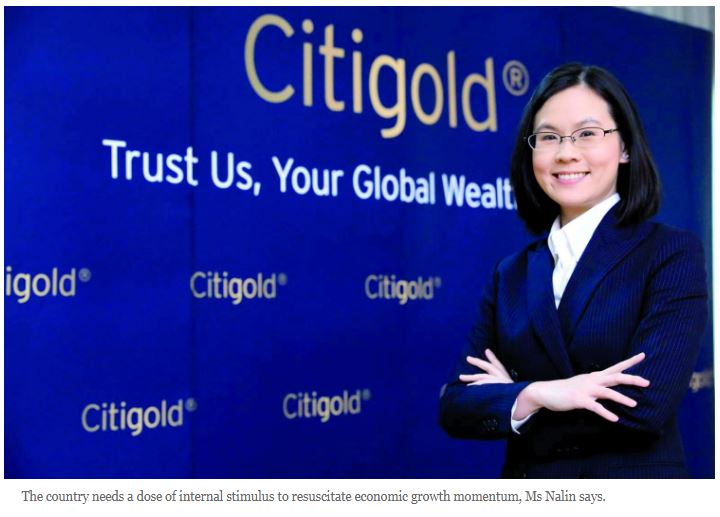Thailand: Citi sees 3.3% GDP growth this year as engines slow
Thai GDP is forecast to expand by 3.3% this year as growth momentum is weighed by an economic slowdown and tepid private investment seen in the first quarter, says Citi Thailand.
“There are downside risks for the economy as growth drivers from the public sector seem to dwindle,” said economist Nalin Chatchotitham.
Full-year exports are anticipated to expand below 3%, while the tourism sector is expected to register a subdued growth lower than 5%, Ms Nalin said.
Thailand’s economy grew at its slowest pace in more than four years in the first quarter, and by less than expected, on a drop in exports and public investment.
The region’s second-largest economy reported first-quarter GDP growth of 2.8% from a year earlier. On a quarterly basis, growth was a seasonally adjusted 1%.
The government may want to accelerate several ongoing infrastructure projects to be completed by this year since the country needs a dose of internal stimulus to resuscitate economic growth momentum, Ms Nalin said.
Accelerated government spending will also help to rein in the baht’s appreciation due to an increase in imports, she said.
The country’s economic growth is likely to pick up to 3.7% next year on expectations that exports and tourism will have an opportunity to expand at better rates compared with this year’s first quarter, Ms Nalin said.
The baht’s value is likely to remain firm until the beginning of 2020 amid a weaker dollar and expectations of US monetary stimulus, she said.
Despite lacklustre growth in exports and tourism, short-term foreign capital inflows have caused the local currency to appreciate recently.
“There is still high sensitivity in terms of currencies and special attention is required, especially for the US dollar, which is likely to weaken due to the US growth outlook markedly slowing,” Ms Nalin said.
As US fiscal stimulus fades, this could prompt the Federal Reserve to cut interest rates in an attempt to shore up economic growth, she said.
Such a scenario would induce some currencies to appreciate in value, including the Japanese yen, the Chinese yuan, the Canadian dollar and the baht, Ms Nalin said.
Citi Thailand forecasts the baht’s value versus the dollar to be in a range of 31.20-31.50 at the beginning of 2020.
Global economic growth is expected to expand at a slower pace this year at 2.9%, down from 3.2% in 2018, according to Citi analysts.
Global inflation is also anticipated to ebb to 2.4% from last year’s 2.7% due to a divergence in fiscal policies from each region and geopolitical uncertainties such as the underpinning US-China trade tensions.
“As the markets still have high fluctuations, we suggest [investors] engage in portfolio management rather than sell equities to hold cash,” said Citi investment consultant Boonnisead Thanyaworanan.
“Investing in bonds and multi-asset allocation are recommended to maximise returns.”
Citi analysts overweight equities and prefer those situated in emerging Asian markets, such as equities in the cyclical stock of energy, communication services, healthcare and materials sectors.
Source: https://www.bangkokpost.com/business/1710847/citi-sees-3-3-gdp-growth-this-year-as-engines-slow


 Thailand
Thailand




